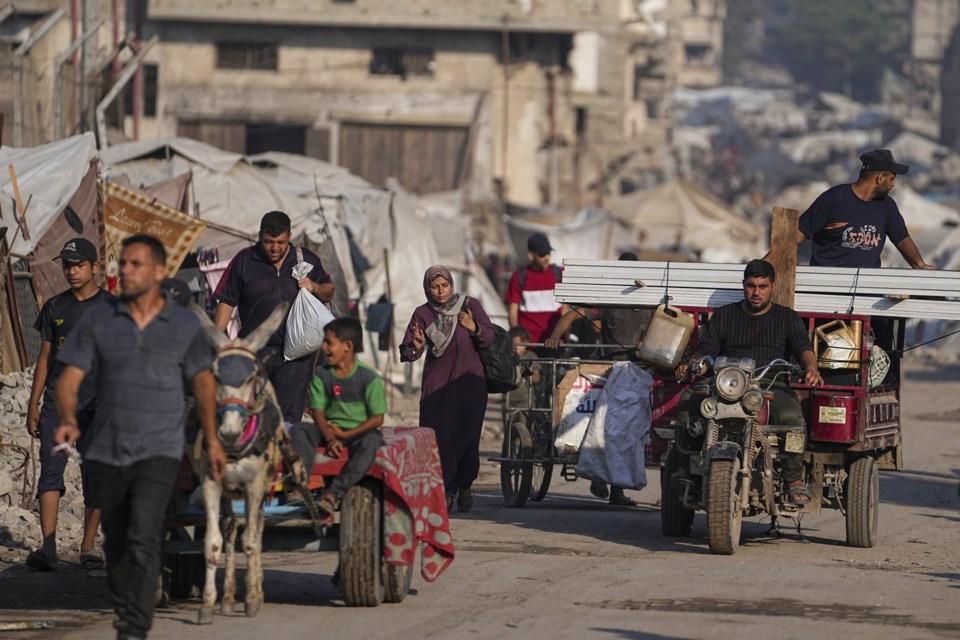OTTAWA — A group of Canadian academics is calling on the federal government to speed up approvals of student visas for Palestinians after two students who were accepted at a Canadian university died before they could leave the region.
Ayman Oweida, chair of the Palestinian Students and Scholars at Risk Network, said the two students, twin sisters, were killed in an airstrike in Gaza in December.
The Palestinian Students and Scholars at Risk Network is a volunteer group of Canadian academics that helps connect Palestinian students at the graduate level and above to research projects in Canada.
But its work was set back by Israeli military operations in the Gaza Strip. The Canadian government has no diplomatic presence there — which means students in the enclave have no way to register biometric data with the government in order to complete their visa applications.
The network says it has placed about 70 students in universities across the country, several with full scholarships.
"In addition to the two students that were killed, 15 students in Gaza who we've accepted have lost family members … direct family members, brothers, sisters, parents, and so on," Oweida said.
Oweida, who researches cancer treatment at the University of Sherbrooke, said one student who was supposed to work with him on a project has been stuck in Gaza for a year.
He said the Canadian side of the network has reached out to MPs to try to resolve the issue, without success.
"I think the Canadian government has really an amazing opportunity here to step up its game and do something … to resolve this issue and bring these students home, home meaning Canada," he said.
One of the Canada-bound students still stranded in Gaza is Meera Falyouna, who is living near the Rafah border crossing.
The 25-year-old masters student said she applied to the University of Regina while living in a tent with her family in December 2023. She was accepted to the industrial engineering program in April 2024 and submitted her Canadian student visa application in July 2024.
Falyouna said she was supposed to start her studies last September. Because she's unable to provide the necessary biometric data for her visa application, she said, her file remains stuck in limbo even as she watches friends move on to study in places like France, Ireland and Italy.
"I don't want to be among the dead people. I want to be counted as dreamers, as future engineers, professors, doctors," Falyouna told The Canadian Press.
"I want to be a person who has impact to Canada and also one day to return back to my country and help to rebuild the Palestinian academic system."
Matthew Krupovich, a spokesman for Immigration, Refugees and Citizenship Canada, said that biometrics can only be completed once someone leaves Gaza.
He added that countries in the region, including Egypt and Israel, control their own entry and exit requirements at their borders.
People coming to Canada from Gaza also have to undergo an additional security screening since the Oct. 7, 2023 attack on Israel.
"As security screening is conducted by agencies outside IRCC, we are unable to provide average processing times. Each application is different and as a result, the time it takes to process may vary," Krupovich said in an email response.
"All study permit applications from around the world are assessed equally and against the same criteria, regardless of the country of origin. Security screening is one, but not the only, factor that can result in higher processing times."
The Rafah border crossing into Egypt has been closed since May 2024. Falyouna said the rest of her family got to Egypt just five days before the border closed.
Falyouna said she fears she and her fellow Palestinian students could lose their placements entirely.
"I'm receiving now a support from my professor. She pushed to accept my defer letter every time, but I'm still in risk to not be accepted next time because I already asked for a defer for my admission three times before," she said.
Aaron Shafer, an associate professor specializing in genomics at Trent University in Peterborough, Ont., said that a Palestinian student who was going to work with him has been trapped in Gaza for eight months.
Shafer said he thinks the student has lost weight in the last eight months due to a dire shortage of food in Gaza.
"He probably weighed — just looking at photos, we've never met — 60 kilograms, but he's a small guy. And last week he said, 'We're happy because people are getting food. We haven't received any yet, but we're happy,'" Shafer said.
Shafer said that about a third of the students who have been accepted by universities in Canada are already in Egypt but are still waiting for their visa applications to be processed.
"It's literally 70 students. And so that's what we're asking for, is to process the visas of 70 students that have positions in Canadian labs," he said.
For now, all Falyouna and the other students can do is wait and try to survive.
"I want to say to the Canadian government that we want to be treated as other students who came from at-risk situations from countries of the world like Ukraine and like Syria," she said.
"We want to be to treated like them. We want to be treated fairly, we want to have the support they got. We just want to be alive to complete our dreams."
This report by The Canadian Press was first published July 4, 2025.
David Baxter, The Canadian Press


